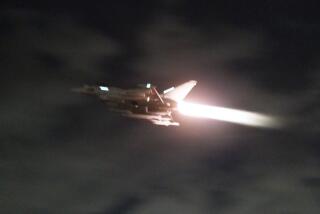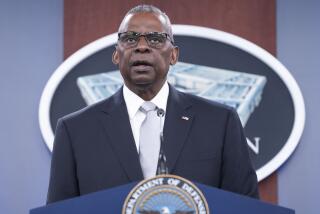Planes Targeted if Iraq Stalls on Peace, U.S. Says
- Share via
WASHINGTON — U.S. military officials have devised plans for resuming hostilities against Iraq, initially by targeting aircraft on the ground, if Saddam Hussein’s government continues to resist allied conditions for a formal cease-fire, Bush Administration officials said Tuesday.
Allied military officials have warned Hussein’s government that its warplanes will be shot down if they take off inside Iraq. Despite the threat, U.S. officials said Tuesday, there is evidence that Iraq is still using combat helicopters to suppress domestic uprisings.
Under orders from Gen. H. Norman Schwarzkopf, allied military officials in Saudi Arabia have made preparations to resume attacks on Iraqi aircraft on the ground if the helicopter missions continue and if President Bush decides to give the order, U.S. officials said.
Even if the Iraqi flights cease, the President could order the military to launch a renewed air campaign if Hussein’s regime drags its heels in agreeing to pay war reparations or resists new allied demands such as the destruction of chemical weapons, the officials said.
The grounded Iraqi planes are “an easy, lucrative target” whose destruction “would be harmful to the (Hussein) regime, and appropriate (to target) in that these are what he’s using to crush the resistance,” said one Administration official.
U.S. officials say that any allied air attacks would be limited in scope and would not lead to resumption of the ground war against Iraq. Even so, they said the allies are prepared to escalate the conflict if necessary to obtain full Iraqi compliance with cease-fire terms if Bush decides to do so.
“We have a temporary suspension of offensive operations,” said a senior Pentagon official. “We’re clearly not spoiling for a fight over there with them anymore. But the United Nations has spelled out what more needs doing and, on that basis, the President could start them up again.”
The official added, however, that the U.S. military “has no such order from the White House right now.”
A resumption of attacks on Iraq’s air force would be conducted by allied warplanes, including U.S. Navy and Air Force jets that have remained in the war theater despite the extensive withdrawal of U.S. forces to bases in Europe and the United States.
“We have a number of options that are retrievable in hours, some in minutes,” said a knowledgeable Pentagon source. “There hasn’t been a relaxation. Combat air patrol sorties, AWACS (electronic surveillance) aircraft and tankers all are still flying. Some of the ‘smart’ munitions are still in theater. And it’s very easy to fly B-52 bombers long distances if necessary.”
Under the terms of the temporary cease-fire, the allies have said they would continue to fly round-the-clock air patrols over Iraq. American fighter planes late last week were ordered to step up their patrols in response to continued flights of Iraqi planes.
Even though U.S. ground forces continue to occupy roughly a quarter of Iraq, U.S. officials said they probably would not be used in any resumption of hostilities because doing so might backfire politically on the alliance.
“The use of land forces would raise questions about whether we were invading his country,” said one U.S. military planner. “Politically, it’s very difficult for us not to look like the aggressor unless we do very surgical-type strikes.”
Pentagon officials said that direct attacks against Iraq’s remaining tank forces--many of which are being used against Kurdish and Shiite Muslim rebels--are improbable. Many of the Iraqi tanks are being used in heavily populated civilian centers.
One senior military official said that any resumption of hostilities would involve a tailored, step-by-step response to Iraqi actions rather than an all-out return to war.
“The basic thing is that you can’t draw them into a full-scale shoot-’em-up,” said a senior military official.
More to Read
Sign up for Essential California
The most important California stories and recommendations in your inbox every morning.
You may occasionally receive promotional content from the Los Angeles Times.














